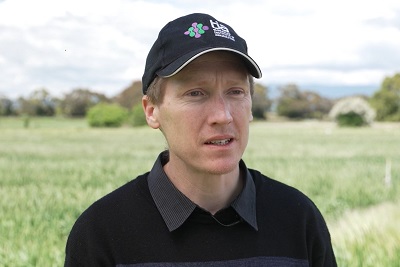TIA Future Forum: Ensuring a sustainable future for Australia's ruminant livestock production
The Tasmanian Institute of Agriculture (TIA) is hosting a virtual Future Forum on 14 May to discuss opportunities identified by Australian scientists to reduce livestock methane emissions.
This 90-minute webinar will discuss some of the possible solutions to abate livestock methane emissions and the challenges that the industry faces as they explore what the future could look like for livestock producers.
The Future Forum will be hosted by TIA’s Dr Apeh Omede in collaboration with the Australian Association of Animal Sciences (AAAS) Vic/Tas branch. Speakers will include Associate Professor Matthew Harrison from TIA, Associate Professor Fran Cowley from the University of New England and Dr Jo Newtown President of the AAAS Vic/Tas branch.
No "one-size-fits-all solution"
Associate Professor Matthew Harrison is the Director of the Carbon Storage Partnerships at TIA and says there is no “one-size-fits-all solution” for managing livestock methane emissions and that farmers should consider their context before formulating an approach.
“Improving liveweight gain and earlier selling of juvenile animals avoids a lot of methane and reduces emissions intensity. For cattle in the rangelands, where farmers might only see them once a year, low-emissions feed supplements are mostly out. For intensive systems, which tend to have smaller paddocks with more growth, such as those in temperate southern Australia, more options are on the table,” Associate Professor Harrison said.
Ruminant livestock account for approximately 14.5 percent of global greenhouse gas emissions because of the natural way the animals process food. In a single year, one cow can belch about 100kg of methane.
TIA helping industry manage greenhouse gas emissions
TIA Director, Professor Michael Rose said researchers at TIA are working on a range of projects aimed at helping the Tasmanian livestock industry manage their greenhouse gas emissions.
“TIA projects such as NEXUS, which is examining the impact of climate change on the livestock industry, and the Asparagopsis low-emission feed technologies project are demonstrating our commitment to achieving a positive climate future. We are working with industry to build resilience to climate change with a focus on limiting greenhouse gas emissions from agriculture and food production,” Professor Rose said.
AAAS Vic and Tas branch
AAAS Vic and Tas branch President, Dr Jo Newton said that reducing methane emissions associated with livestock production is a priority area for Australian agriculture, requiring collaboration across research disciplines and with industry stakeholders.
“As the national membership organisation for people involved in Animal Science, the AAAS aims to create opportunities for learning, discussion and idea exchange. AAAS Vic and Tas branch welcomes the opportunity to collaborate with TIA on this event – sharing the latest insights into challenges and potential solutions associated with reducing methane emissions from livestock production,” Dr Newton said.
Register for the TIA Future Forum ‘Ensuring a sustainable future for Australia’s ruminant livestock’ online at bit.ly/TIASustainableLivestock
Subscribe to TIA's mailing list to receive up to date news and events.
TIA is a joint venture between the University of Tasmania and the Tasmanian Government.



